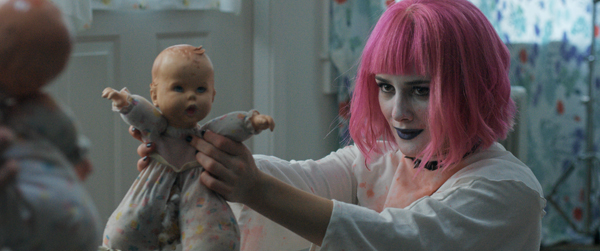If you’re going to make a movie about a homecoming, you’d better come up with some fresh ideas, because this sort of thing has been done. A lot. Zach Clark’s Little Sister brings some style to the genre, but low energy and loosely managed whimsy limit its scope. Save for a rush of madness toward the end, this movie is so deadpan it barely has a pulse.
Young, pretty Colleen (Addison Timlin, evoking a timid Winona Ryder) is in training to become Sister Joan of Arc in a Brooklyn nunnery. After shunning her family for years, she borrows her implausibly glam mother superior’s car to head back to the family homestead in Asheville, NC. Time to face a quirky cast of characters that includes a drug-addicted, needy, and unstable mother (a caustic Ally Sheedy); an immature Peter Pan dad (Peter Hedges); and a maimed, reclusive brother (Keith Poulson), whose wounded face is connected to an American tragedy of a particular time and place. A straight character in a movie full of unhappy but variably lovable misfits, Colleen will soon be questioning her past and possibly losing her religion.
Little Sister makes us reflect on America’s own long strange trip by playing out in a specific era, not that long ago but seemingly far, far away. The date is around Halloween 2008, when America pins its hopes on a fresh-faced senator to lead a Bush-weary nation—a memory that today invites its own meditation on dashed hopes. Snippets of televised debates and political spoofs keep us in the narrow moment, and, to Clark’s credit, the technique works.
Brother Jacob has withdrawn from family life, so Colleen tries to break through to him with nostalgic appeals to their bygone goth youth. For someone supposedly committed to a religious vocation, Colleen seems mighty ready to don black lipstick, act out a baby-killing scene while lip-synching to a gnarly Gwar song, and play drinking games. Since Clark’s way of exploring Colleen’s faith is restricted to a series of shots of her cartoonishly praying in profile, we don’t get a sense of what role God plays in her life, which might have added depth and intrigue to the story.
Familiar works such as Garden State, Welcome to the Dollhouse, and even Donnie Darko come to mind as the film rolls on, albeit with a looser, more determinedly madcap feel. DIY touches like animal masks, manic heavy metal drum bursts (Jacob’s way of acting out), reunions with ugly duckling pals, random flashbacks, and a sort of orgy in Halloween costumes stamp Little Sister as indie-flavored, as does its modishly retro soundtrack. So do heartfelt confrontations that end in affirming bromides like, “We’re all screw-ups. I guess that’s why we love each other.” Reactions to bizarre and even tragic events feel distant, dazed, disconnected. Like the recent The Diary of a Teenage Girl, the film dredges up a lot of hot, stinging emotions but declines to really deal with them.
Insufficiently biting as satire and not affecting enough to make a real emotional connection, Little Sister drifts in the lukewarm shallows, unwilling to swim in any direction.

















Leave A Comment